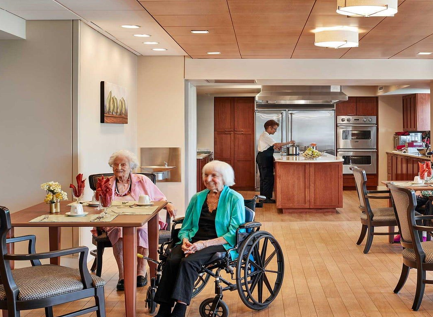
Aging is an unstoppable process, and each one of us will come to our golden age at some point. With aging comes wisdom but also the necessity of extra care. And some of our loved ones are already in that position.
Nursing homes are of great help to families in need of elderly care. These are institutions that cater to older people who need 24/7 supervision and support due to health challenges. They usually can’t manage to live and function alone. In nursing homes in Rochester NY, they have proper medical care, company, and activities.
The decision of taking your parent, grandparent, or any other close elderly to senior living can be emotional. As such, it’s important to learn about the various senior living options, offered services, and how to find the best place for your loved ones. This guide will give you the necessary information to make a well-thought-out decision.
Types of Nursing Homes
Nursing homes are of diverse types, categorically created for various types of care. The first type is skilled nursing homes which provide care for people in need of constant medical attention with extensive monitoring due to severe sickness. Such facilities employ registered nurses and provide services such as physical and occupational therapy, post-operative care, wound recovery, etc.
On the other hand, there are assisted living facilities for seniors needing medical help, but not requiring continual nursing care. These people usually need help with daily duties like bathing, dressing, or managing medical treatments. These places are more like a community setting with social activities for residents.
A special type of nursing home is memory care for those suffering from Alzheimer’s or dementia. These patients need a safe environment to help them deal with their conditions and enhance cognitive functions. Choosing the right nursery for seniors is crucial to ensure their happy golden age.
Factors to Consider When Choosing a Nursing Home
The first step in making this choice is learning about nursing home types. Then, you should consider a few more factors. For starters, you should look for a nearby facility, as that allows for more frequent visits and makes your senior feel more at home by seeing friends and family more often.
Next, think about the quality of care within a facility. Ask about the services offered, staff qualifications and experience, how many patients each staff is likely to monitor, as well as whether the facility has a unique treatment plan for each patient. The latter means a lot when a patient has a severe medical condition.
Nursing home amenities also matter. These can be anything from social services and physical treatments to fitness and yoga classes. Also, pay great attention to the building’s hygiene and security. Last, but not least, make sure the chosen facility is licensed and certified by state and federal law to provide medical services.
Costs and Payment Options
Senior living for the elderly comes with certain costs you should have in mind. You surely want the best for your loved ones, but it’s of utmost importance to understand the financial implications. Expenses can differ by level of care, facility location, etc. Thus staying in a nursing home can cost from thousands to tens of thousands of dollars a month.
Payment options depend on whether you have medical insurance or not. On this page, learn how to choose a proper one. For instance, Medicare pays for short-term care but not long-term stays in the nursing home. On the other hand, Medicaid covers a significant part of these costs, but only for eligible patients.
If you don’t have this type of coverage, you can pay for nursing home in cash. This out-of-pocket cost can be a significant burden to any budget, so it’s always wise to explore all options. If necessary, get help from governmental programs and long-term care insurance. These can cut down your costs and help you get the best care for your loved ones.
How to Evaluate Service Quality

We’ve already mentioned things you have to factor in when choosing a nursing home. The quality of care is of the utmost importance to provide your loved one with the best. For starters, look for facility reviews and ratings using reputable sources like Medicare.
You can find details about nursing homes’ staff, services, health inspections, etc. But don’t trust the writings blindly. You can visit the attended facility and check cleanliness, how employees treat seniors, and the overall facility atmosphere.
Get information on the number of residents and how many skilled workers handle them. It also matters what kind of activities patients can take throughout the day. If you spot any sign of disorganized work, communication issues, and neglect, move on. You don’t want your loved ones to stay in a substandard, ill-equipped, or unsafe environment.
Resident Rights
Senior living residents must enjoy dignity, safety, and quality of life. They have the freedom to make decisions on their care, treatment, and daily routines. They must be treated with respect and not be abused, neglected, or restrained. People also have the right to privacy and confidentiality of personal and medical information they give to a nursing home.
In the U. S., there’s a law called the Nursing Home Reform Act that protects these rights. It makes it possible for all the residents to be treated with dignity and get medical attention. In case your elderly ever feel mistreated or even abused, don’t hesitate to report it to the facility managers or local advocacy associations. You want the best for them, and the best is what they should get.
On the following source, find handy tips on transition to senior living:
https://www.forbes.com/health/senior-living/how-to-transition-to-senior-living/
Taking your beloved senior to a nursing home to provide them with quality care and support is a good decision. So take your time and effort to research all options and get more information about care quality, costs, and resident rights. That’s the only way to have peace of mind and secure the best environment for your loved ones.



Facebook Comments